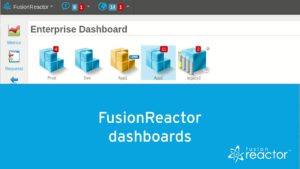In this blog we are going to cover the metrics available in FusionReactor.
Metrics in FusionReactor are stored in memory on the local FusionReactor instance and stored both in log files and the cloud. Logs in FusionReactor are available for 31 days by default and rotate hourly. However, this can be adjusted in the settings.
The cloud will store high-level metrics for 90 days as well as low-level metrics for 7 days. In the FusionReactor cloud, you have the ability to create profiles and graphs based on any of the metrics sent by FusionReactor. This, therefore, allows you to create custom views and data to highlight potential issues and areas of improvement.
Metrics In FusionReactor Categories
Transaction Metrics
Metrics can be viewed for flexible time periods from as little as 60 seconds up to 90 days. The available metrics can be broken down into 3 categories;
-Transaction Metrics
Transactions are individual actions running in your application, for example, a web request, database or HTTP request. Transaction metrics are stored at an individual transaction level, with aggregate metrics for the application and transaction type.
Transaction types include a web request, JDBC, HTTP, Mongo, Kafka, and any other tracked transaction. You can see the transaction metrics either in the transactions tab of an instance or in the applications view.
Within the details view, you can see headers, JDBC, relations, JSON, profiles errors, and any other tracked data, depending on the transaction types and events that occurred. These metrics allow you to find and fix issues without having to debug or collect additional data.
-Resource Metrics
Resource metrics are the data we collect on the JVM. For example, memory, class loading, thread, and CPU data. JVM metrics allow you to drill down into the heap and non-heap memory. This includes memory spaces and buffer pools. Drill down into the loaded classes and JIT time, and further down into threads. This includes state, CPU usage, and the ability to stack trace and profile threads on demand.
-System Metrics
System metrics are the data available for the server running Java. This includes the running processes, CPU, memory, network, and disk usage. This allows you to see if the java process is being limited by other processes on the server.
FusionReactor APM delivers you the telemetry to diagnose issues within your app or server. You can use transaction metrics to find performance issues or errors at the code level.
Use resource metrics to troubleshoot and tune the java environment for issues such as memory leaks or starvation. In addition use system metrics to find external factors slowing down applications such as network or disk limits.



